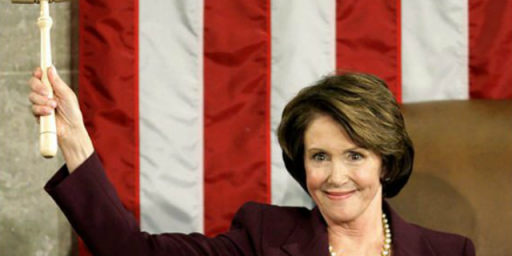Democrats’ Progessive Wing Less Powerful Than Thought?
Alexandria Ocasio-Cortez and other firebrands aren't steering the ship. Yet.

FiveThirtyEight’s Perry Bacon Jr. seeks to explain, “Why Democrats’ Most Liberal Wing Is Struggling To Gain Power.” He begins by explaining his seemingly controversial premise:
I argued in a piece published earlier this week that the “Super Progressive” bloc of the Democratic Party was largely losing its fights with the party’s Progressive Old Guard wing. Big ideas pushed by more liberal Democrats like Rep. Alexandria Ocasio-Cortez — such as the Green New Deal, the impeachment of President Trump and single-payer health care — just aren’t getting much traction right now in the House, which Democrats control.
In particular, it seems like the most progressive wing of Democrats is not as influential under Democratic control of the House as the Freedom Caucus— the bloc of the most conservative House Republicans — was when the GOP controlled the chamber.
So this is a narrow framing. Bacon is talking about the agenda of the House of Representatives, not the party as a whole or even the Presidential field. And he’s comparing it to the domination that its GOP analog has managed in recent years. Fair enough.
Still, his explanation suggests that the party as a whole isn’t moving as far toward the progressive agenda as many of us think:
The Democrats’ base is more moderate than the GOP’s
The number of Democratic voters who identify as liberal has been increasing for some time, but the party is still about equally split between people who call themselves “liberal” and people who call themselves “moderate” or “conservative.” In the GOP, by contrast, people who say they’re “conservative” outnumber liberals and moderates. And you can see this difference in how elected officials behave. Polls suggest that more aggressively liberal positions (like impeachment) garner a fair amount of opposition1 among Democratic voters. This makes it easier for House Democratic leaders like Speaker Nancy Pelosi to sideline those ideas.
Instead, Pelosi is pushing forward proposals that are nearly universally popular among Democrats, such as allowing Americans to register to vote on Election Day.
“Progressive media and activists would not reward the most aggressive tactics,” said Gregory Koger, who is a political science professor at the University of Miami and studies Congress. “In 2013, there were conservative groups and media arguing sincerely that they could repeal the ACA by shutting down the government. If a super-progressive House member tried to argue on MSNBC or on Daily Kos that the House Democrats could force the Republicans to overturn the 2017 tax cut if Nancy Pelosi had the ‘courage’ to hold the debt limit hostage, he or she would be heckled.”
Now, I’m not sure I’m buying this explanation.
While Elizabeth Warren, Bernie Sanders, and Ocasio-Cortez have done an admirable job moving the Overton window, the fact of the matter is that the Republican Party spent decades making “liberal” a bad word and “conservative” a badge of honor. Further, Rush Limbaugh and the Fox News talking heads have been denouncing “moderates” as indecisive wimps for a quarter century. So, the fact that Republicans proudly label themselves “conservative” while Democrats are hesitant to call themselves “liberal” isn’t much of a measure of ideological preference.
And, while I agree that the Democratic base is more interested in wonky details than their GOP counterparts, it’s not at all clear to me that they would “heckle” attempts by their party leadership to get things done by playing hardball. Certainly, they applauded Pelosi and company’s holding firm through the longest government shutdown in US history to avoid giving President Trump his wall. And, while the overwhelming majority of Americans oppose impeaching Trump, 62 percent of Democratic respondents in the same poll favor it.
The Democratic moderate wing is powerful too
The Congressional Progressive Caucus is bigger than ever; it boasts 96 of the 235 Democrats in the House as members. But the New Democrat Coalition, a bloc of more moderate members, is bigger than ever too, and it now includes 101 members. Many of those members are not particularly excited about single-payer health care, the Green New Deal or other lefty stances. And while most of these members don’t have the same national profile as rising liberal stars such as Ocasio-Cortez, they have the same one vote that she does. Perhaps more importantly, many of these members are in swing districts — and Pelosi is focused on making sure these members can get re-elected in 2020.
“Pelosi is clearly keeping her eye on the prize of a Democratic Congress and White House,” said Matthew Green, a political science professor at Catholic University who specializes in congressional politics. “Her strategy is very similar to the one she followed as speaker in 2007 and 2008 — bring up bills popular with the base that also force moderate Republicans to break with their party, while staying clear of polarizing issues that could galvanize the opposition or alienate moderate voters.”
Green predicted that, if Democrats have control of the House, the Senate and the presidency after 2020, Pelosi might be willing to push more liberal goals, as she did in 2009 in embracing Obamacare and a cap-and-trade environmental bill.
To me, these are separate issues.
It’s clearly true that there are plenty of Democratic districts where the progressive agenda takes a back seat to more pressing matters. But the more important takeaway here is that Pelosi—who surely sympathizes ideologically with the progressives more than the moderates—is a shrewd, disciplined leader.
And, indeed, Bacon gives that a whole section:
Pelosi is a powerful speaker
The Freedom Caucus — perhaps because they are more closely aligned with GOP voters than the Congressional Progressive Caucus is with Democratic voters, and because Fox News and Trump are able to galvanize the party’s activists — was often able to run roughshod over the speaker, overpowering John Boehner or forcing Paul Ryan to bend to its will.
Pelosi, in contrast, seems fairly willing to ignore her party’s left wing — and as the speaker, she ultimately has the power to determine what bills come up for votes in the House. But Green argued that Pelosi’s power does not come just from her role as speaker.
“I don’t think Pelosi’s formal power alone explains why she is more immune to her party’s extreme wing than Boehner or Ryan, who also had substantial formal power. Her informal power is probably more important. She commands the support of committee chairs, whom she had substantial say in appointing,” said Green.
But, while this is indeed a testament to Pelosi’s skills, it’s also a function of the contrasts between the two caucuses. It seems like things have changed since Will Rogers’ day.
The Super Progressive bloc may be too big
You would think having more members would make a congressional bloc more powerful, but its broad membership might be having the opposite effect. “The Congressional Progressive Caucus is far larger than the Freedom Caucus, making it harder for them to reach agreement on strategy,” Green said. (The Freedom Caucus does not publicize its membership, but estimates in 2017-18 put its number at around 30.)
The progressive bloc includes some members of Congress who are more closely allied with Pelosi than with Ocasio-Cortez, for example. Indeed, she has floated the idea of creating a smaller, closer-knit group outside of the formal Progressive Caucus. I think that might be a more effective way for the most liberal members to pursue their goals.The Super Progressives won’t blow things up
Cohesiveness aside, though, the Freedom Caucus members were influential in part because they were willing to engage in very aggressive tactics (opposing must-pass bills to fund the government and to increase the nation’s debt ceiling, for example). That approach gave them a lot of leverage. There is no indication at this point that the Democrats’ liberal wing will take similar steps — they are part of the pro-government party after all.
“The ties that bind the Freedom Caucus together seem to be more ideologically-oriented or value-oriented than to be about specific policies,” said Jennifer Victor, a political science professor at George Mason University. “The fact that the Progressive Caucus is more policy-oriented suggests they may be more willing to negotiate within their party than the Freedom Caucus was.”
Now, Bacon thinks this may all change.
I’d emphasize so far, however. Remember that in 2009 it was considered a fairly left wing position to propose including a public option — a Medicare-style plan Americans could opt into — as part of the health insurance choices offered through the Affordable Care Act. Now, the public option is considered a more centrist position, and many Democrats are going a step further and backing single-payer health care (in which Americans would get their coverage through a government-run system). So the progressives may, over time, push the party left. But the first months of 2019 suggest that progressives won’t be successful immediately — and maybe no one should have expected them to be.
The different behaviors of the Progressive Caucus and Freedom Caucus reminds me of an argument from the early days of blogging.
When I launched OTB in January of 2003, Republican-leaning, Iraq War-supporting blogs dominated the scene. Within a couple of years, though, Daily Kos and blogs from the other side of the aisle started to dominate and that continued throughout the heyday of the genre. (It’s been years since anyone bothered to track such things.)
The rationale given for this turn of events was that, while conservative bloggers tended to be individualistic, looking out for their own interests and willing to engage in internecine fights over purity, liberal bloggers were more naturally communal, working together for a common purpose. Most of us on the right were commentators, perhaps hoping to go pro as columnists or talk show hosts, while most on the left were activists, perhaps hoping to go pro as party apparatchiks. While that was overstated—and elided external factors, including the failure of the Iraq War and the loss of the original uniting factor within the right-blogosphere—there was some truth to it.
Bacon seems to be implying that something similar is happening in the House. While the Tea Party and later Freedom Caucus were willing to burn the place down, the Progressive Caucus seems more willing to fall in line. How much of that reflects their culture and how much the skills of the leadership is hard to say, although it’s certainly some of both.





Not sure why but that made me smile.
I think the main difference between the Freedumb Caucus and the Progressive Caucus has to do with the fact that the progressives came to DC in order to actually accomplish something, something more than just burning down the entire structure upon which good governance rests. An arsonist with a 5 gallon can of Kerosene and a book of matches can do a whole lot of damage real fast, and the GOP has been playing footsies with those guys ever since 1980.
The progressives in the DEM party, including the newest members, understand that if they are going to accomplish anything, they need to do it together.
eta: and they know it takes time to do it.
I don’t think this is complicated: media narrative have exaggerated the influence of AOC and others because they crave a narrative that the GOP is going crazy one way and the Dems in another. There is a frequent attempt at parallelism: the GOP had the Tea Party, ergo AOC and company are the Dem version.
But there has been nothing like the Tea Party in Democratic elections and therefore no analog to the Freedom Caucus.
Further, a lot of this is legislative math: I am not convinced there is a sufficient numbers of progressives to influence the Dems the way the Freedom Caucus has the GOP, nor do I think at this point there is evidence they wish to behave the same way in any event.
The Democrats are not going crazy. The same Silent Generation pragmatists who’ve wielded the power in the party for the last 30 years are still solidly in control.
Bottom line, younger members want big changes fast. More experienced members want to go slow and build on what we have. The fast-changers get a lot of airplay but that doesn’t mean their ideas are being enacted. This is not really different from the past.
But it is possible this may play out differently than before. Given the Republican Party’s total collapse with respect to actually legislating, and the enormous difficulties in forming a third party, we may end up with a national Democratic Party that tracks cities like Baltimore or Chicago. In those cities if you want to have an impact you have to be a Democrat, which results in a very high diversity within the party. The factions within the party take the place of the usual Republican/Democrat split.
The only people who think that Ilhan Omar and AOC are in charge of Congress are half-wit idiots who get all their information from Fox News and such.
That recent analysis that in 6 weeks FoxNews mentioned AOC over 3,100 times? That wasn’t just a random programming fluke. They’re making her the new Hillary. And she is a Latina so the precious White Working Class is going to be trained to hate her extra hard.
@Steven L. Taylor:
Conservatives have an intrinsic advantage: it is much easier to put together a movement to oppose something than to support something. The GOP has been very good at opposing Democratic policy initiatives but terrible at advancing their own agenda. I suspect the Democrats are going to find the same thing.
(Note: that assumes the GOP really has a positive agenda, which I’m not sure they do.)
Nancy Pelosi’s “favorable” ratings are lower than Trump’s.
@James Pearce:
Apples v. oranges. How do Pelosi’s ratings compare to Mitch McConnell’s? How do McConnell’s compare to anyone’s?
This is purely speculative, not based on any data: what if the more policy-oriented former Republicans, repulsed by the turn their party has taken, have been going into the Democratic party? They’d dilute the mix, as it were, making it more moderate.
@MarkedMan:
That’s how things played out in Alabama—and presumably most of the Deep South—for decades. In the Governor’s race, in particular, the Democratic primary was for all intents and purposes the general election. That got upended in 1986 when the Democratic leadership overturned the winner of the primary on technical—albeit legitimate—ones and people flooded to a frankly unqualified Republican in Guy Hunt. The strangehold was forever broken after that.
Very interesting column. Thank you! I looked up an archived poll or two from those exciting days of long ago when Pres Bill Clinton got impeached. Although we hear it every time the subject comes up it is pretty astonishing how much the general public disliked that business from the R’s. Something like 65% of all voters said that Bill ‘deserved’ to finish his term and about the same number said that Congressional Repubs ‘did not share’ their morals or values. Bill’s numbers on general ‘approval’ jumped some 15% — to the 70% level. This was AFTER the hearings and Monica news.
I bet that if hearings ever are held (what a thing to say about Congress! “IF” they are allowed to hold hearings! Think about that!) — as I say — IF hearings are held on Pres Trump’s finances and apparent corruption and abuse of his powers, I bet there are majority numbers positive about impeachment.
@Dave Schuler:
What will the picture be like in 10 years when the Silents are gone?
@Teve:
Exactly.
Democrats are very slow to start their messaging. I’d be running ads frequently that contain the audio of Trump saying that he harasses women because he can. Same with the ‘fine people on both sides’ audio juxtaposed with footage of white supremacist rallies.
@charon:
Mitch’s are bad too, and if you want to get into pissing contest territory, you can say they’re twice as bad.
The whole lot of them –Trump, Pelosi, Schumer, McConnell– have high unfavorable ratings.
@Andy:
Better, probably.
There wouldn’t be this pent up rage/demand for some of the goofy progressive goofy schemes if the last 30 years hadn’t been captured by these miserable failures.
Another reason that the Freedom Caucus had undue power over Boehner and Ryan is the Repugs adherence to the Hastert Rule, i.e. the speaker would not advance a piece of legislation for a vote unless that legislation could pass with only the support of the repug conference.
AOC mentioned on Twitter that she was only fluent in two languages, but rusty in two more, and Google is not helping me figure out what the other two are.
@Teve: “AOC mentioned on Twitter that she was only fluent in two languages, but rusty in two more, and Google is not helping me figure out what the other two are.”
According to Fox News, they are Marxism and Evil.
I’m not sure self-identification is very useful. I call myself conservative, but I don’t think many people in the Republican Party would agree with my self-assessment.
On the so-called progressive issues:
– Impeachment: I believe in the rule of law, and congressional oversight. I think impeaching this president is necessary because of that.
– Medicare For All: I prefer market-based solutions where they work, but am willing to accept public solutions where the market cannot function. The market has failed, it’s hurting business throughout our economy, and we have examples of public healthcare solutions working elsewhere.
– Green New Deal: Global warming and climate change are real, happening now, and we have to protect ourselves. Protecting ourselves is conservative. GND isn’t really up to the level of a plan yet, but I’m willing to move subsidies around and help the transition that has to happen.
– Taxes: Taxes should be roughly equal to spending, and federal taxes need to be progressive since state and local taxes are regressive. A mostly balanced budget is a pretty conservative position.
From a poll that Doug linked to in another post, 68% of people who disapprove of Trump support impeachment. That suggests to me that the Trumpets are the problem here, not the Democrats.
84% of those who approve of Trump believe he shouldn’t be investigated so much.
@Andy:
Remember the beginning of The Terminator, when SkyNet’s tank is rolling across the field of skulls? It will probably be like that.
Millennials, they ruin everything, amirite?
That’s funny considering you were the one who first brought comparing favorable ratings…
And what are these “goofy progressive goofy schemes”…
@An Interested Party:
That’s called “a typo.”
Ahh, so there really aren’t any goofy progressive schemes… that’s good to know…
I don’t see how they’ll be able to fuck things up more spectacularly than Boomers have, and am starting to think that I won’t live long enough to watch them get a chance to.
@OzarkHillbilly: “An arsonist with a 5 gallon can of Kerosene and a book of matches can do a whole lot of damage real fast…”
And never forget, the right has the backing of the actual elites in this country.
@JohnMcC: “Although we hear it every time the subject comes up it is pretty astonishing how much the general public disliked that business from the R’s.”
When discussing impeachment, everybody should remember that the equivalent to Clinton’s impeach would be if the Stormy Daniels scandal had not broken, and after making massive accusations about this, that and the other, Mueller staged a perjury trap, and asked Trump under oath if he had had sex with Stormy Daniels.
@An Interested Party: You think we’re going to have a serious discussion on this topic after you were clowning on me for a typo?
Nope.
@Gustopher:
Unlike many in my generation (Gen-X), I am not a millennial basher – I reserve most of my scorn for the boomers and the silents.
@James Pearce: What are you talking about? He just wanted some examples of the ” goofy progressive schemes” from you. I also would like to know WTF you’re talking about with that statement.
@Matt: Exactly…the only one clowning here is Pearce…